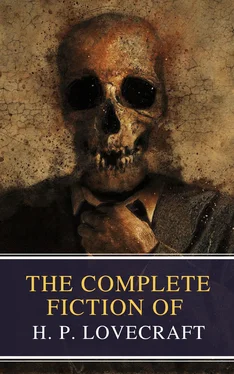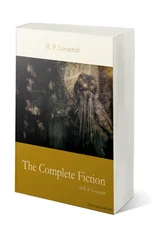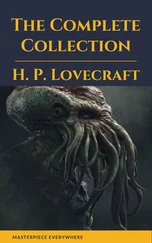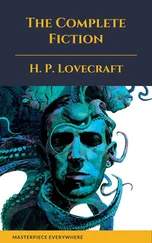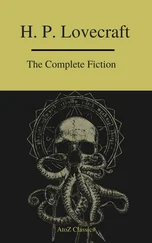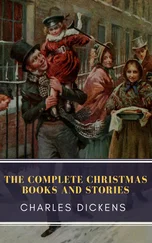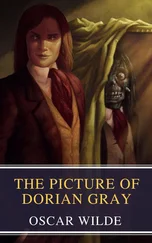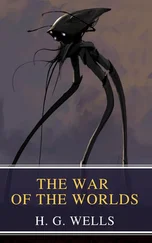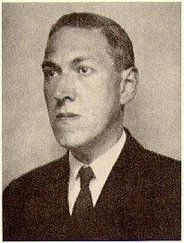The evilly grinning beldame still clutched him, and beyond the table stood a figure he had never seen before—a tall, lean man of dead black colouration but without the slightest sign of negroid features; wholly devoid of either hair or beard, and wearing as his only garment a shapeless robe of some heavy black fabric. His feet were indistinguishable because of the table and bench, but he must have been shod, since there was a clicking whenever he changed position. The man did not speak, and bore no trace of expression on his small, regular features. He merely pointed to a book of prodigious size which lay open on the table, while the beldame thrust a huge grey quill into Gilman’s right hand. Over everything was a pall of intensely maddening fear, and the climax was reached when the furry thing ran up the dreamer’s clothing to his shoulders and then down his left arm, finally biting him sharply in the wrist just below his cuff. As the blood spurted from this wound Gilman lapsed into a faint.
He awaked on the morning of the 22nd with a pain in his left wrist, and saw that his cuff was brown with dried blood. His recollections were very confused, but the scene with the black man in the unknown space stood out vividly. The rats must have bitten him as he slept, giving rise to the climax of that frightful dream. Opening the door, he saw that the flour on the corridor floor was undisturbed except for the huge prints of the loutish fellow who roomed at the other end of the garret. So he had not been sleep-walking this time. But something would have to be done about those rats. He would speak to the landlord about them. Again he tried to stop up the hole at the base of the slanting wall, wedging in a candlestick which seemed of about the right size. His ears were ringing horribly, as if with the residual echoes of some horrible noise heard in dreams.
As he bathed and changed clothes he tried to recall what he had dreamed after the scene in the violet-litten space, but nothing definite would crystallise in his mind. That scene itself must have corresponded to the sealed loft overhead, which had begun to attack his imagination so violently, but later impressions were faint and hazy. There were suggestions of the vague, twilight abysses, and of still vaster, blacker abysses beyond them—abysses in which all fixed suggestions of form were absent. He had been taken there by the bubble-congeries and the little polyhedron which always dogged him; but they, like himself, had changed to wisps of milky, barely luminous mist in this farther void of ultimate blackness. Something else had gone on ahead—a larger wisp which now and then condensed into nameless approximations of form—and he thought that their progress had not been in a straight line, but rather along the alien curves and spirals of some ethereal vortex which obeyed laws unknown to the physics and mathematics of any conceivable cosmos. Eventually there had been a hint of vast, leaping shadows, of a monstrous, half-acoustic pulsing, and of the thin, monotonous piping of an unseen flute—but that was all. Gilman decided he had picked up that last conception from what he had read in the Necronomicon about the mindless entity Azathoth, which rules all time and space from a curiously environed black throne at the centre of Chaos.
When the blood was washed away the wrist wound proved very slight, and Gilman puzzled over the location of the two tiny punctures. It occurred to him that there was no blood on the bedspread where he had lain—which was very curious in view of the amount on his skin and cuff. Had he been sleep-walking within his room, and had the rat bitten him as he sat in some chair or paused in some less rational position? He looked in every corner for brownish drops or stains, but did not find any. He had better, he thought, sprinkle flour within the room as well as outside the door—though after all no further proof of his sleep-walking was needed. He knew he did walk—and the thing to do now was to stop it. He must ask Frank Elwood for help. This morning the strange pulls from space seemed lessened, though they were replaced by another sensation even more inexplicable. It was a vague, insistent impulse to fly away from his present situation, but held not a hint of the specific direction in which he wished to fly. As he picked up the strange spiky image on the table he thought the older northward pull grew a trifle stronger; but even so, it was wholly overruled by the newer and more bewildering urge.
He took the spiky image down to Elwood’s room, steeling himself against the whines of the loomfixer which welled up from the ground floor. Elwood was in, thank heaven, and appeared to be stirring about. There was time for a little conversation before leaving for breakfast and college, so Gilman hurriedly poured forth an account of his recent dreams and fears. His host was very sympathetic, and agreed that something ought to be done. He was shocked by his guest’s drawn, haggard aspect, and noticed the queer, abnormal-looking sunburn which others had remarked during the past week. There was not much, though, that he could say. He had not seen Gilman on any sleep-walking expedition, and had no idea what the curious image could be. He had, though, heard the French-Canadian who lodged just under Gilman talking to Mazurewicz one evening. They were telling each other how badly they dreaded the coming of Walpurgis-Night, now only a few days off; and were exchanging pitying comments about the poor, doomed young gentleman. Desrochers, the fellow under Gilman’s room, had spoken of nocturnal footsteps both shod and unshod, and of the violet light he saw one night when he had stolen fearfully up to peer through Gilman’s keyhole. He had not dared to peer, he told Mazurewicz, after he had glimpsed that light through the cracks around the door. There had been soft talking, too—and as he began to describe it his voice had sunk to an inaudible whisper.
Elwood could not imagine what had set these superstitious creatures gossiping, but supposed their imaginations had been roused by Gilman’s late hours and somnolent walking and talking on the one hand, and by the nearness of traditionally feared May-Eve on the other hand. That Gilman talked in his sleep was plain, and it was obviously from Desrochers’ keyhole-listenings that the delusive notion of the violet dream-light had got abroad. These simple people were quick to imagine they had seen any odd thing they had heard about. As for a plan of action—Gilman had better move down to Elwood’s room and avoid sleeping alone. Elwood would, if awake, rouse him whenever he began to talk or rise in his sleep. Very soon, too, he must see the specialist. Meanwhile they would take the spiky image around to the various museums and to certain professors; seeking identification and stating that it had been found in a public rubbish-can. Also, Dombrowski must attend to the poisoning of those rats in the walls.
Braced up by Elwood’s companionship, Gilman attended classes that day. Strange urges still tugged at him, but he could sidetrack them with considerable success. During a free period he shewed the queer image to several professors, all of whom were intensely interested, though none of them could shed any light upon its nature or origin. That night he slept on a couch which Elwood had had the landlord bring to the second-story room, and for the first time in weeks was wholly free from disquieting dreams. But the feverishness still hung on, and the whines of the loomfixer were an unnerving influence.
During the next few days Gilman enjoyed an almost perfect immunity from morbid manifestations. He had, Elwood said, shewed no tendency to talk or rise in his sleep; and meanwhile the landlord was putting rat-poison everywhere. The only disturbing element was the talk among the superstitious foreigners, whose imaginations had become highly excited. Mazurewicz was always trying to make him get a crucifix, and finally forced one upon him which he said had been blessed by the good Father Iwanicki. Desrochers, too, had something to say—in fact, he insisted that cautious steps had sounded in the now vacant room above him on the first and second nights of Gilman’s absence from it. Paul Choynski thought he heard sounds in the halls and on the stairs at night, and claimed that his door had been softly tried, while Mrs. Dombrowski vowed she had seen Brown Jenkin for the first time since All-Hallows. But such naive reports could mean very little, and Gilman let the cheap metal crucifix hang idly from a knob on his host’s dresser.
Читать дальше
